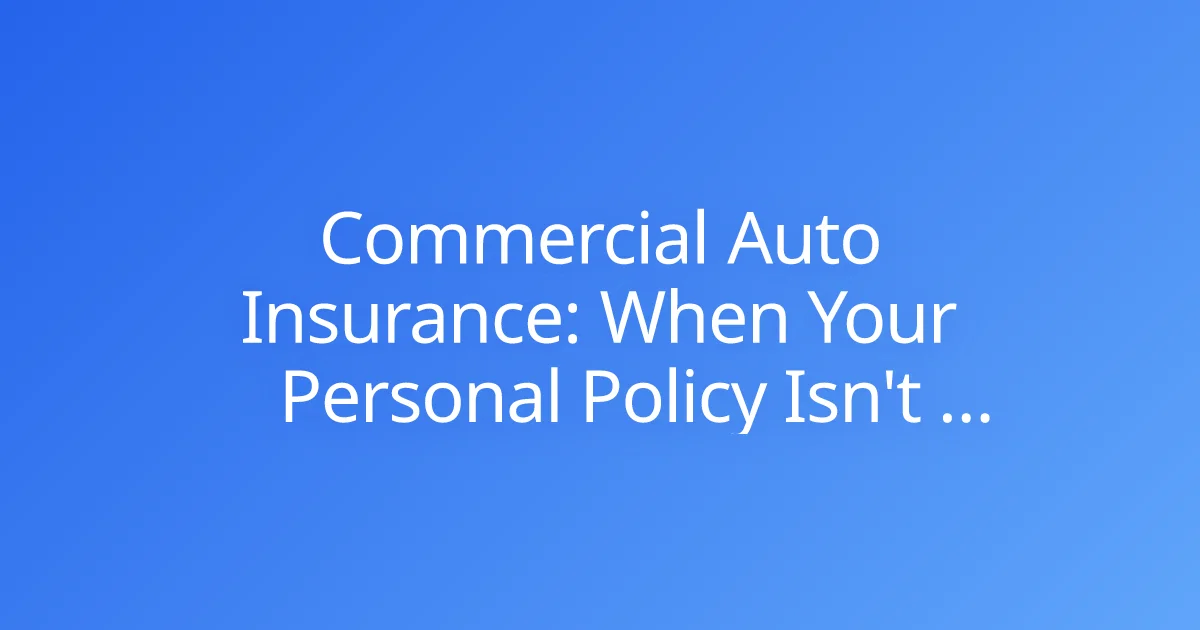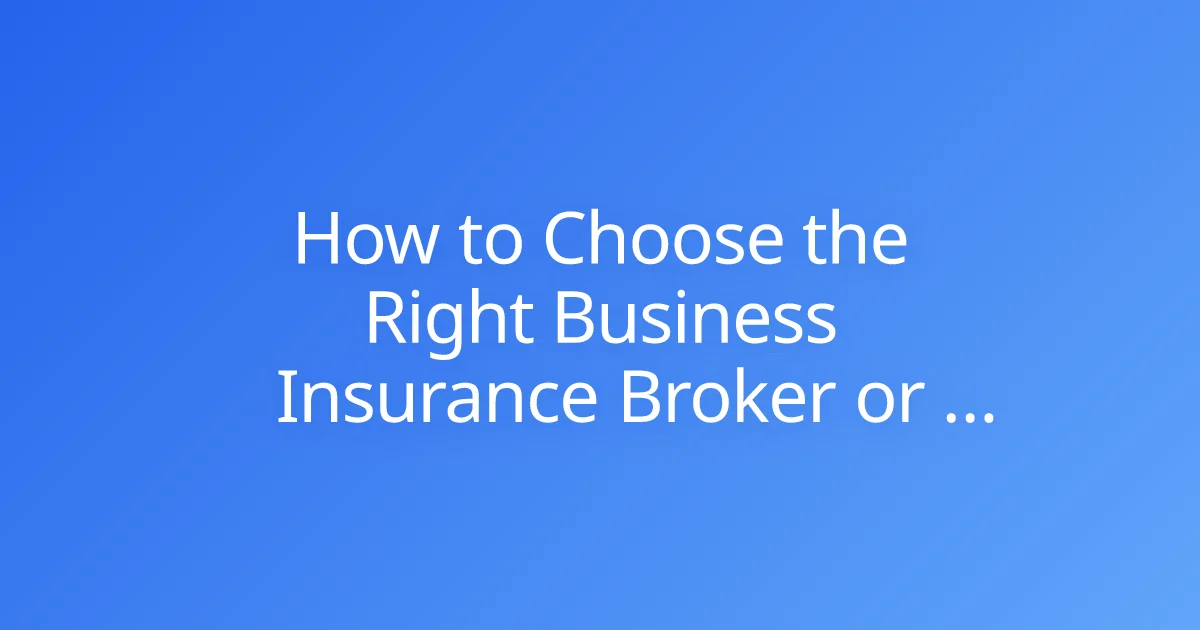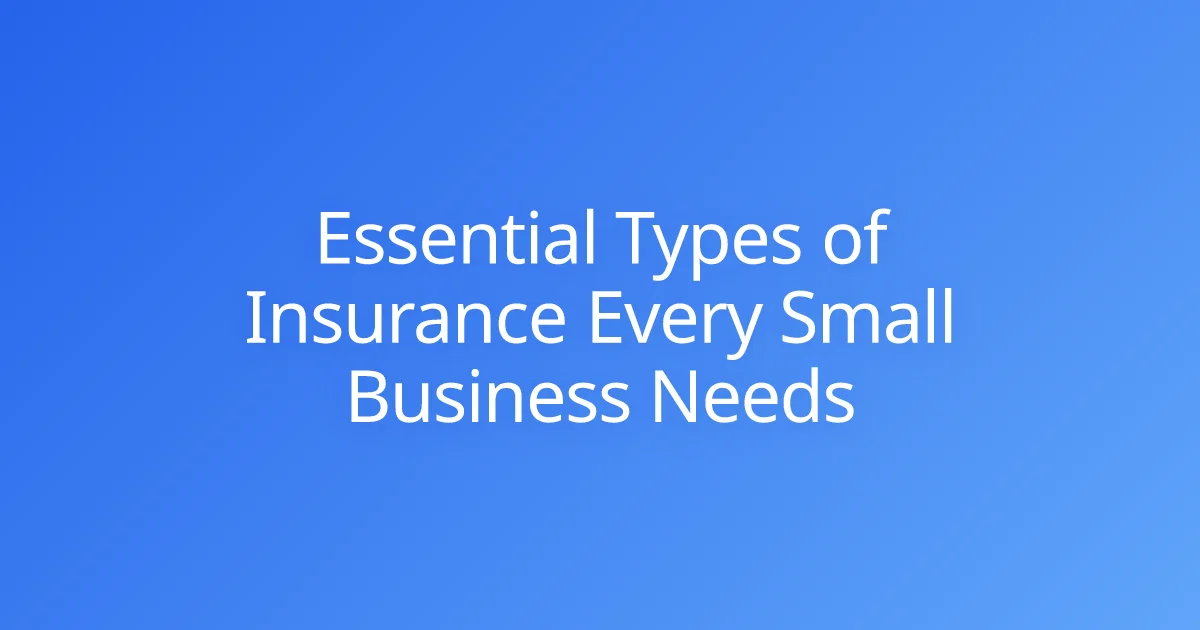Commercial Auto Insurance: When Your Personal Policy Isn't Enough
Many small business owners, freelancers, and entrepreneurs unknowingly expose their ventures to significant financial risk every time they use their personal vehicle for work-related tasks. You might think, "My personal auto policy covers me, right?" The alarming truth is that for business-related incidents, a personal auto policy often falls short, explicitly excluding coverage for certain commercial activities. This critical blind spot can leave you personally and professionally vulnerable to devastating lawsuits, property damage, and lost income after an accident.
At The Policy Explainer, we understand the complexities of safeguarding your business. This comprehensive guide will illuminate the crucial distinction between personal and Commercial Auto Insurance, explaining precisely when your personal policy isn't enough. We will detail the essential protections that commercial vehicle insurance provides, highlight common scenarios where it's indispensable, and empower you to make informed decisions to protect your business assets and operations from the unique risks of business driving.
The Critical Distinction: Personal vs. Commercial Auto Insurance
At its core, the difference between a personal auto policy and Commercial Auto Insurance lies in the intended use of the vehicle and the nature of the risk the insurer is willing to assume.
Personal Auto Insurance: For Private Use
A personal auto policy is designed to cover individuals and families using their vehicles for non-commercial purposes: commuting to a fixed workplace, running errands, leisurely drives, and personal transportation. The premiums are calculated based on the perceived risk of these everyday activities.
- Key Focus: Protecting personal assets from liability stemming from typical private use.
- Exclusions: Most personal policies contain explicit exclusions for business use, especially if the vehicle is used to transport goods or paying passengers, or if it's owned by a business entity.
Commercial Auto Insurance: For Business Operations
Commercial Auto Insurance is specifically tailored for vehicles used for business-related purposes. This includes everything from sedans used for client meetings to heavy-duty trucks making deliveries.
- Key Focus: Protecting the business (and often the owner's personal assets) from liability and property damage related to commercial driving.
- Risk Assessment: Insurers consider factors like the type of business, the number of vehicles, the distance traveled, the type of cargo, and the vehicle's weight and design when underwriting a commercial policy. These risks are typically much higher than personal use.
The fundamental reason a personal policy won't suffice is that the risk profile for business use is significantly different. An accident while making a delivery, transporting equipment, or providing a service carries a much higher potential for large liability claims and unique perils that personal policies are not designed to cover.
When Your Personal Auto Policy Falls Short: Scenarios Demanding Commercial Coverage
The line between personal and business use can sometimes feel blurry, but for insurance purposes, clarity is essential. Here are common scenarios where your personal auto policy isn't enough, making Commercial Auto Insurance a necessity:
1. Transporting Goods or Equipment for Your Business
If your vehicle is used to transport products, materials, tools, or equipment essential to your business operations, you likely need commercial coverage.
- Examples:
- A plumber carrying tools and pipes to job sites.
- A caterer delivering food and supplies to events.
- A landscaper hauling mowers, trimmers, and plants.
- An artisan delivering handmade products to customers or markets.
- Why it matters: The added weight, potential for cargo damage, and increased mileage and exposure significantly elevate the risk profile.
2. Carrying Paying Passengers (Ride-Sharing, Taxi Services)
If you use your vehicle to transport people for a fee, even part-time, your personal policy will not cover you.
- Examples: Ride-share drivers (Uber, Lyft), taxi services, limousine services, tour operators.
- Why it matters: This is a high-risk activity with significantly increased liability exposure. While ride-share companies offer some coverage, it's often supplemental and only active when you're on a ride, leaving gaps. A dedicated Commercial Auto Insurance policy or a specific ride-share endorsement is crucial.
3. Using the Vehicle as a Primary Tool of Your Trade
If your vehicle is integral to the delivery of your service, it falls under commercial use.
- Examples:
- A mobile pet groomer operating out of a van.
- A food truck.
- A mobile repair service (e.g., computer repair, appliance repair).
- A mobile car wash service.
- Why it matters: The vehicle itself is central to generating income, and its unique outfitting or constant presence at different locations creates specific commercial risks.
4. Employees Driving Company-Owned Vehicles
If your business owns vehicles that employees drive, Commercial Auto Insurance is absolutely mandatory.
- Examples: Delivery vans for a bakery, sales cars for a pharmaceutical company, service trucks for a utility company.
- Why it matters: The business, as the vehicle owner and employer, is liable for the actions of its employees while they are on company business.
5. Fleets of Vehicles
If your business owns multiple vehicles (a "fleet"), you'll need specialized fleet insurance, which is a type of Commercial Auto Insurance.
- Examples: Construction companies with multiple trucks, taxi companies with numerous cabs, large delivery services.
- Why it matters: Managing risk for multiple vehicles requires a comprehensive commercial approach, often leading to better rates and simplified management under a single policy.
6. Displaying Business Advertising or Logos
Even if your usage seems minor, simply having your business name or logo prominently displayed on your vehicle can trigger the need for commercial coverage.
- Why it matters: This signifies to an insurer that the vehicle is primarily being used for commercial purposes, changing its risk profile.
Key Coverages of a Commercial Auto Insurance Policy
Just like a personal policy, Commercial Auto Insurance comprises various coverage types designed to protect your business from different risks.
1. Commercial Auto Liability Coverage
This is the cornerstone of any commercial auto policy, protecting your business from the financial fallout if you or an employee causes an accident.
- What it Covers:
- Bodily Injury Liability: Pays for medical expenses, lost wages, and pain and suffering of third parties injured in an accident where your business vehicle is at fault.
- Property Damage Liability: Pays for damages to other vehicles, property (e.g., buildings, fences), or infrastructure caused by your business vehicle.
- Why it's Essential: This coverage is legally required in most states and protects your business's assets from devastating lawsuits.
2. Physical Damage Coverage
This protects your business's vehicles themselves from damage.
- Collision Coverage: Pays for damage to your business vehicle resulting from a collision with another vehicle or object, regardless of fault.
- Comprehensive Coverage: Protects against non-collision damage, such as theft, vandalism, fire, falling objects, or damage from natural disasters (e.g., hail, flood).
- Why it's Essential: Ensures your crucial business vehicles can be repaired or replaced, minimizing downtime and protecting your investment.
3. Medical Payments / Personal Injury Protection (PIP)
Depending on the state, this coverage pays for medical expenses for you and your passengers (employees, clients) in an accident, regardless of fault.
- What it Covers: Medical bills, and in some states, lost wages and rehabilitation costs for occupants of your commercial vehicle.
- Why it's Essential: Provides immediate care for those in your vehicle, reducing potential out-of-pocket medical costs.
4. Uninsured/Underinsured Motorist Coverage (UM/UIM)
Protects your business if your vehicle or its occupants are involved in an accident caused by a driver who is uninsured or doesn't have enough insurance to cover your damages.
- What it Covers: Bodily injury to your occupants and sometimes damage to your vehicle.
- Why it's Essential: Safeguards your business from losses caused by financially irresponsible drivers.
5. Other Important Commercial Auto Coverages
- Hired and Non-Owned Auto Liability: Covers liability if your employees drive their personal vehicles for business tasks or if you rent vehicles for business use. This is crucial for businesses that don't own a fleet but have employees using their own cars.
- Cargo Coverage: Important for businesses transporting goods. Covers damage or theft of the cargo being carried.
- Towing and Roadside Assistance: Covers the cost of towing your commercial vehicle after a breakdown or accident.
- Rental Reimbursement: Pays for a rental vehicle if your business vehicle is undergoing covered repairs.
Factors Affecting Commercial Auto Insurance Premiums
Commercial Auto Insurance premiums are influenced by several factors, reflecting the unique risks associated with business driving:
- Type of Vehicle: Heavy-duty trucks, vans, and specialized vehicles typically cost more to insure than sedans.
- Industry: Businesses in high-risk industries (e.g., construction, transportation, delivery) will generally pay higher premiums.
- Driving Records: The driving history of all individuals who will operate the commercial vehicle (including employees) is a major factor. Accidents or violations can significantly increase costs.
- Mileage and Usage: Vehicles driven more frequently, over longer distances, or in high-traffic areas will have higher premiums.
- Coverage Limits and Deductibles: Higher liability limits and lower deductibles will result in higher premiums.
- Location: The area where the vehicles are garaged and primarily operated (urban vs. rural, crime rates).
- Safety Programs: Insurers may offer discounts for businesses with robust safety programs, driver training, and telematics systems.
- Claims History: A history of frequent or large claims will lead to higher premiums.
Getting the Right Commercial Auto Insurance for Your Business
Choosing the correct Commercial Auto Insurance policy is crucial for protecting your business.
1. Accurately Assess Your Business Use
Be completely honest with your insurance provider about how your vehicles are used for business. Failure to disclose commercial use could lead to a denied claim when you need it most. Consider:
- How often are vehicles used for business?
- What is being transported (people, goods, tools)?
- Who is driving the vehicles (employees, owner, contractors)?
- Are vehicles owned, leased, or rented?
2. Determine Adequate Coverage Limits
Work with an insurance expert to determine liability limits that adequately protect your business's assets. Consider your potential exposure to a major lawsuit, especially if you operate in a high-risk industry or transport valuable goods. Minimum state requirements are often insufficient.
3. Consider Bundling Policies
Many insurers offer discounts if you bundle your Commercial Auto Insurance with other business policies, such as General Liability or a Business Owner's Policy (BOP).
4. Implement Safety Measures
Promoting safe driving practices among your employees can not only prevent accidents but also potentially lower your premiums through a better claims history. Consider:
- Regular vehicle maintenance.
- Defensive driving courses.
- Policies against distracted driving.
5. Work with a Commercial Insurance Specialist
The best way to navigate the complexities of Commercial Auto Insurance is to consult with an insurance agent or broker who specializes in commercial insurance. They can:
- Help you accurately identify your specific business risks and vehicle usage.
- Explain the nuances of different coverages and their limitations.
- Tailor a policy that fits your unique business needs and budget.
- Shop around with various reputable carriers to find the most competitive rates.
Conclusion
For any business where vehicles play a role in operations, relying solely on a personal auto policy isn't enough to provide adequate protection. Commercial Auto Insurance is a vital shield against the unique and often substantial risks associated with business driving, covering everything from liability for accidents and damage to your vehicles to the costs of protecting your business from serious financial setbacks. By understanding the critical distinctions, recognizing when your business needs dedicated commercial coverage, and securing the right policy, you empower your enterprise to navigate the roads ahead with confidence and unparalleled peace of mind. Do you have more questions about insuring your specific type of commercial vehicle or managing a growing fleet?



